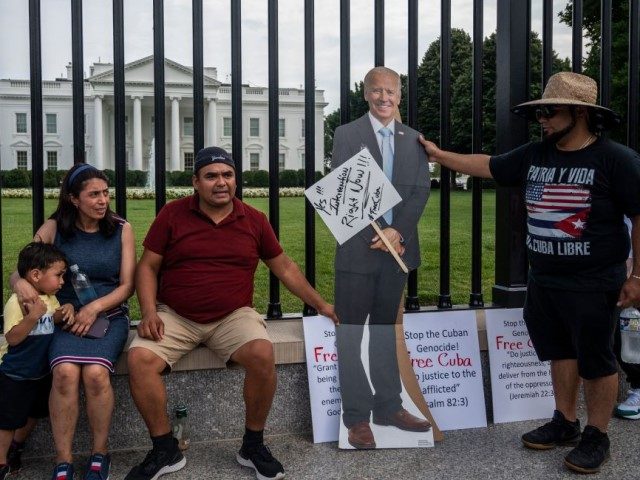The administration of leftist President Joe Biden announced late on Monday that it would undo measures implemented under his predecessor Donald Trump to keep American money from enriching Cuba’s communist regime and would expand travel to the country and remove limits on cash flows to the regime in the form of remittances.
The move came on the same day that the Communist Party implemented a new penal code that allows the state to imprison a Cuban national for three years for the crime of “insulting” a regime official. The Castro regime previously imprisoned Cubans for insulting officials but typically had to resort to imprisoning citizens on shaky legal grounds, accusing them of “crimes” like “desacato” (“disrespect”) or public disorder. The new penal code, which created 37 new “crimes,” eliminates the need for the regime to attempt to justify or whitewash its political repression.
The Biden administration’s move also follows a brutal crackdown on pro-democracy dissidents – some of whom protested the Castro regime by waving American flags – who participated in the mass national protests on July 11, 2021.
An estimated 187,000 people took to the streets of nearly every municipality on the island of Cuba that day to demand an end to communism, resulting in widespread arrests and human rights abuses such as violent door-to-door raids on suspected protesters. In one case, Cuban regime agents shot a man suspected of having protested in his own living room – in front of his toddler twin sons.
Following the protests and door-to-door raids against peaceful protesters, Cuba’s legal system conducted mass trials of up to 30 people at once, often sentencing them to decades in prison for “vandalism,” “sedition,” and other crimes like “disrespect.” Many of those sentenced are children. In March, the Castro regime sentenced two 16-year-old boys to ten years in prison and a 17-year-old boy to 19 years in prison for opposing communism.
Despite the repression, protests have continued consistently on the island, now far from the spotlight of American corporate media.
Cuba is a U.S.-designated state sponsor of terrorism. For its egregious human rights violations, the State Department announced a series of rewards to the Castro regime on Monday that it masked as “measures to support the Cuban people.”
“We will authorize scheduled and charter flights to locations beyond Havana. We also will implement regulatory changes to reinstate group people-to-people and other categories of group educational travel, as well as certain travel related to professional meetings and professional research,” the State Department announced, “including to support expanded Internet access and remittance processing companies and to provide additional support to Cuban entrepreneurs.”
“Group people-to-people” is an exemption to travel restrictions – allegedly in place to prohibit Americans from engaging in tourism in Cuba – that essentially allows tourism but is defined as “education” for authorized organizations with the White House’s blessing, like universities. The most egregious abuse of “group people-to-people” to allow tourism by Americans was the granting of licenses under that exemption to luxury cruise lines to access Cuban ports.
President Trump eliminated the “group people-to-people” exception in 2019. An analog created by President Barack Obama – “individual people-to-people,” which essentially legalized tourism and made it possible for a parade of Hollywood celebrities to flood Havana and enrich the regime during the Obama era – also disappeared under Trump.
The State Department also announced it would “ensure that remittances flow more freely to the Cuban people while not enriching those who perpetrate human rights abuses. Specifically, we will remove the current limit on family remittances of $1,000 per quarter per sender-receiver pair and will authorize donative (i.e., non-family) remittances, which will support independent Cuban entrepreneurs.”
The State Department did not explain how it would ensure that lifting limits on remittances – a core source of revenue for the Castro regime – would not enrich “those who perpetrate human rights abuses” or if it had implemented any measures to fulfill that promise.
“We will make it easier for families to visit their relatives in Cuba and for authorized U.S. travelers to engage with the Cuban people, attend meetings, and conduct research,” State Department spokesman Ned Price claimed. “We will encourage the growth of Cuba’s private sector by supporting greater access to U.S. Internet services, applications, and e-commerce platforms.”
As a communist country, Cuba does not have a legal “private sector.”
Cuba’s Foreign Relations Ministry (Minrex) celebrated the measures in a statement late Tuesday, calling them “positive but of very limited reach.” Minrex applauded Biden for “alleviating [the effects] of inhuman decisions taken by the government of President Trump.”
Minrex helped sell the Biden administration’s spin that the new measures, which will aid the Castro regime tremendously, “do not modify the blockade in any way absolutely, or the principal economic measures taken by Trump,” but conceded that Biden had taken “a limited step in the right direction” in the eyes of the communists.
“The government of Cuba reiterates its disposition to initiate a respectful dialogue on equal footing with the government of the United States,” the regime agency said.
Cuba regularly interrupts international diplomatic events with mob attacks and interrupts discussion panels featuring political dissidents with disruptive shouting until event organizers give up and cancel the event.
The Biden team had campaigned on reversing Trump’s Cuba policies – a move that likely contributed to Democrats’ catastrophic collapse in support among Hispanic Americans – but officials admitted that rewarding the Castro regime after the repression of July 11 protesters was too politically toxic, so they “hit the pause button” last year.

COMMENTS
Please let us know if you're having issues with commenting.